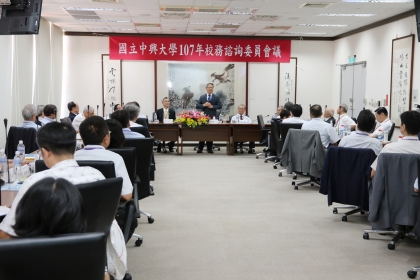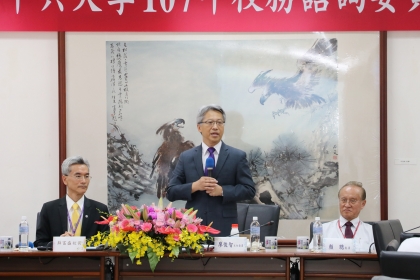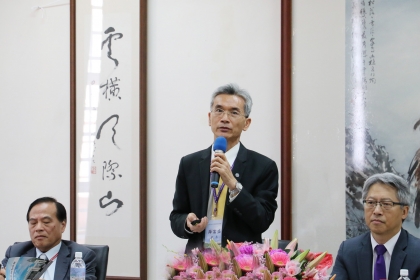NCHU school advisory committee meeting: Former Presidents collectively conveyed useful propositions
2018-07-13
興新聞張貼者
Unit秘書室
2,606
National Chung Hsing University (NCHU) held its school advisory committee meeting on July 13th, 2018. The meeting was convened by the President of Academia Sinica, James C. Liao(廖俊智). The meeting this year differed from previous ones as most of its participants were either former presidents or retired department heads of the school. The meeting was well attended, with 17 committee members present, and during the meeting, useful observations and propositions on school affairs were effectively conveyed.
NCHU has held their school advisory meeting annually for the past 13 years, and since its establishment, the meetings have been the first of its kind amongst Taiwanese universities. Fuh-Sheng Shieu(薛富盛), the current President of NCHU, briefed attendees on relevant school affairs during the morning session. He was followed by four department heads, who presented the four development directions of NCHU’s improvement plan. These include showcasing the university’s unique features, implementing innovative teaching skills, improving pedagogy quality, and promoting both the public’s awareness and social responsibility of higher education. In the afternoon, committee members participated in three breakout sessions, which comprised of fields including the social sciences, science and engineering, and agricultural/biomedical studies.
President Shieu thanked his predecessors for laying the university’s strong foundation, upon which the current and future school administration will continue to improve. Next year, NCHU will celebrate its centennial anniversary and entrance into a new century. The former presidents and retired department heads were invited to be committee members with the expectation that they will put forward effective suggestions to allow NCHU to strive further and better.
James C. Liao, President of Academia Sinica, said that two of the newly appointed academicians this year were from NCHU, which demonstrates the amount of talent NCHU students have. NCHU may be celebrating its centennial next year, but beyond celebrating the achievements of the past, the school must also consider what the future direction of the university will be, going forward.
During the general discussion session, committee members raised several invaluable suggestions in regards to school affairs. James C. Liao, the meeting host, concluded the meeting by summarizing the comments of its members. They are as follows:
First, the school must adopt and facilitate unique research capacities. This includes becoming a world-class university with research facilities which benefit from and complement other fields. The adoption of one or two highly specialized research fields were recommended. This way, even if the university fails to rank overall among Taiwanese universities, it can at least become the first choice for graduate students who seek to specialize in unique fields. In this fashion, by creating unique research areas, NCHU could eventually become an internationally acclaimed university.
Second, a modern faculty evaluation scheme must be established. As an example, the rapid rise of Singaporean universities in recent years can be attributed to their effective teacher evaluation system, which has a contemporary evaluation system that advances the quality of each department and school.
Third, the school must attract and cultivate talent. Besides hiring renowned faculty, it’s equally important to cultivate young domestic faculty members with potential. This would aid the long-term strategy to guarantee the availability of talent in the country.
Fourth, the declining birth rate must be considered both a crisis and an opportunity. In the future, the ratio of teachers to students would be lowered, which would potentially enhance teaching quality. Also, Academia Sinica is willing to work with NCHU to create an internationally-oriented graduate program, which would help promote research and cultivate talent.
Finally, NCHU’s academic strengths must be combined with sustainability concerns. To “tackle future problems now”, and to consider “What will be the most pressing issues in twenty years?”, air pollution, energy, agriculture and other issues must be considered. NCHU could find solutions to the problems that human beings will face in the future.
NCHU has held their school advisory meeting annually for the past 13 years, and since its establishment, the meetings have been the first of its kind amongst Taiwanese universities. Fuh-Sheng Shieu(薛富盛), the current President of NCHU, briefed attendees on relevant school affairs during the morning session. He was followed by four department heads, who presented the four development directions of NCHU’s improvement plan. These include showcasing the university’s unique features, implementing innovative teaching skills, improving pedagogy quality, and promoting both the public’s awareness and social responsibility of higher education. In the afternoon, committee members participated in three breakout sessions, which comprised of fields including the social sciences, science and engineering, and agricultural/biomedical studies.
President Shieu thanked his predecessors for laying the university’s strong foundation, upon which the current and future school administration will continue to improve. Next year, NCHU will celebrate its centennial anniversary and entrance into a new century. The former presidents and retired department heads were invited to be committee members with the expectation that they will put forward effective suggestions to allow NCHU to strive further and better.
James C. Liao, President of Academia Sinica, said that two of the newly appointed academicians this year were from NCHU, which demonstrates the amount of talent NCHU students have. NCHU may be celebrating its centennial next year, but beyond celebrating the achievements of the past, the school must also consider what the future direction of the university will be, going forward.
During the general discussion session, committee members raised several invaluable suggestions in regards to school affairs. James C. Liao, the meeting host, concluded the meeting by summarizing the comments of its members. They are as follows:
First, the school must adopt and facilitate unique research capacities. This includes becoming a world-class university with research facilities which benefit from and complement other fields. The adoption of one or two highly specialized research fields were recommended. This way, even if the university fails to rank overall among Taiwanese universities, it can at least become the first choice for graduate students who seek to specialize in unique fields. In this fashion, by creating unique research areas, NCHU could eventually become an internationally acclaimed university.
Second, a modern faculty evaluation scheme must be established. As an example, the rapid rise of Singaporean universities in recent years can be attributed to their effective teacher evaluation system, which has a contemporary evaluation system that advances the quality of each department and school.
Third, the school must attract and cultivate talent. Besides hiring renowned faculty, it’s equally important to cultivate young domestic faculty members with potential. This would aid the long-term strategy to guarantee the availability of talent in the country.
Fourth, the declining birth rate must be considered both a crisis and an opportunity. In the future, the ratio of teachers to students would be lowered, which would potentially enhance teaching quality. Also, Academia Sinica is willing to work with NCHU to create an internationally-oriented graduate program, which would help promote research and cultivate talent.
Finally, NCHU’s academic strengths must be combined with sustainability concerns. To “tackle future problems now”, and to consider “What will be the most pressing issues in twenty years?”, air pollution, energy, agriculture and other issues must be considered. NCHU could find solutions to the problems that human beings will face in the future.




